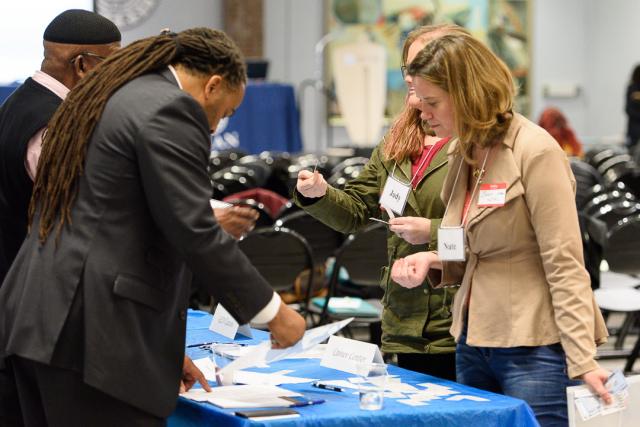Walking in the Shoes of Ex-offenders

Getting out of prison is only the first step toward freedom for ex-offenders in New Jersey.
More than 150 professionals in law enforcement, corrections, criminal justice and social services got a small sense of just how difficult it can be to rebuild your life after getting out of a prison during the recent Re-Thinking Re-Entry simulation event held at Kean.
In a role-playing exercise, participants followed in the footsteps of a person recently released from prison, applying for identification cards, birth certificates and bank accounts, and interacting with social services and parole offices. Many landed in a mock jail for failing to follow the rules.
“In programs like this, we try to identify where weaknesses in a re-entry program are, so we can build them into strengths,” said James Drylie, Ph.D., executive director of the School of Criminal Justice and Public Administration. “If you can get someone assistance at the exit level, perhaps they won’t return to prison.”
The United States has one of the highest criminal recidivism rates in the world. According to a Bureau of Justice Statistics study, five out of six state prisoners released in 2005 were arrested at least once during the nine years after their release.
Former New Jersey State Sen. Raymond J. Lesniak, founder and president of the Lesniak Institute for American Leadership at Kean and a leader on criminal justice reform, spoke at the event. He advocated for legislation he sponsored that would initiate a re-entry program at the start of an inmate’s prison sentence, offering incentives for inmates to get vocational training, and individual and group therapy.
“Preparing prisoners during incarceration for re-entry and removing barriers to employment upon release will increase public safety, save tax dollars and save lives,” he said.
Brandon Miles, a sophomore computer science student, volunteered at one of the tables as the “ex-offenders” worked their way through the simulation.
“You see what happens to people when they get out of jail, and they are trying to get their lives together,” he said. “It is a struggle for them. It shouldn’t be so hard. It's shameful.”



